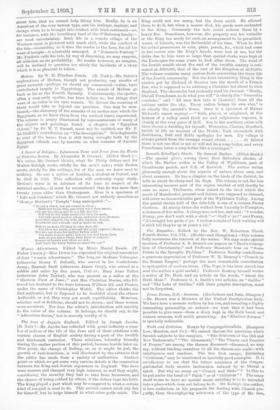The Jews of Angevin England. Edited by Joseph Jacobs.
Nutt.)—Mr. Jacobs ha e collected with great industry a num- 'bar of notices of the life of the Jews and of their relations with various classes of English society during a part of the twelfth :and thirteenth centuries, These relations, tolerably friendly during the earlier portion of this period, became hostile later on. This point, the change of feeling, or, as it might be put, the growth of Anti-Semitism, is well illustrated by the extracts that the editor has made from a variety of authorities. Another point on which we get some very curious details is the connection 'between the King and Jewish sojourners in England. The Jews were usurers and charged very high interest, as well they might, considering the security they had to take from borrowers, and the chance of being robbed by others, if the debtor kept his faith. The King played a part which may be compared to what a certain kind of sea-gull is used to do. This animal cannot catch any fish for himself, but he helps himself to what other gulls catch. The King could not use usury, but the Jews could. He allowed them to do it, but when a usurer died, his goods wore escheated to the King. Commonly the heir could redeem them by a heavy fine. Sometimes, however, the property was too valuable or the King too needy for such an arrangement to be permitted. Aaron, of Lincoln, was the Rothschild of his time. When he died his actual possessions in coin, plate, jewels, &c., which had come in due course into the King's hands, were lost at sea, but the debts due to him were so large that special clerks were kept at the Exchequer for some years to look after them. The total of the Jewish wealth about the end of the twelfth century is esti- mated at £600,000, that of the rest of the Kingdom at £720,000. The volume contains many curious facts concerning the inner life of the Jewish community. Not the least interesting thing is the oration put by Richard of Devizes into the mouth of a French Jew, who is supposed to he advising a Christian lad about to visit England. The chronicler had evidently read his Juvenal. "Ready, like all Frenchmen, to do what you will "is clearly the " Graeculus esuriens ;" and "All men flow into it [London] from all the nations under the sky. Every nation brings its own vice," is as clearly the satirist's Rome. Here is a specimen of Master Richard's smart sayings :—" Bath, placed, or misplaced, at the bottom of a valley amid thick air and sulphurous vapours, is clearly at the very gates of Hell. Nor in the northern cities wilt thou choose a dwelling for thyself; Worcester, Chester, Hereford, lavish of life on account of the Welsh ; York etboundeth with. Scotchinen, foul and fickle apologies for men. Ely village is always putrid from the swamps round about. . At Bristol there is not one that is not or will not be a soap-boiler, and every Frenchman hates a soap-boiler like a scavenger."


































 Previous page
Previous page